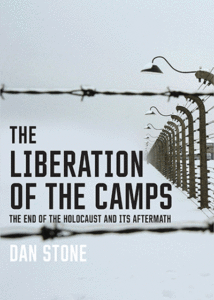The Liberation of the Camps: The End of the Holocaust and its Aftermath, by Dan Stone, Yale University Press, 288 pages, $32.50
Reviewed by NEAL GENDLER
Dan Stone shows that many Shoah survivors had two liberations: the first when their Nazi guards disappeared and the second after prolonged confinement in displaced persons camps.
The Nazi camps brought abuse, torment, starvation and death. The DP camps, most of them in Germany — adding insult to injury — brought confinement, discouragement and despair. As before the war, Jews wanted to leave but had almost nowhere to go.
“After the tremendous elation of having survived came the sobering realization that one had lost everything — family, home, everything,” said survivor Anita Lasker-Wallfisch. “One had to start over again.”

Stone divides The Liberation of the Camps about equally between the two kinds, first telling us how uncommon was the popular image of Jews in striped uniforms jubilantly welcoming the first Allied soldiers, then focusing on survivors’ “existential angst of discovering that their families had been killed, that they alone remained,” and the continued isolation of Jews that lasted for years.
Stone, a modern history professor at the University of London, writes simply and clearly, basing his superb book “largely on survivor testimony, written and spoken, of which there is now a vast amount.” Source notes, bibliography and index run 53 pages of small type.
For many survivors, “liberation” was quiet. Guards vanished from camps, workplaces or death marches and death trains — journeys of starvation and sickness. Of 714,000 inmates recorded in January 1945, at least one third were dead by war’s end, Stone says.
Many of those still in camps were too sick to celebrate. British troops reaching Bergen-Belsen on April 15, 1945, were stunned by 10,000 unburied bodies, prisoners so weak they couldn’t move and barracks floors six inches deep in feces. After liberation, 13,000 died.
“Liberation freed [survivors] from Nazi rule, but not from its effects,” Stone says, calling liberation a process over time that for some was very long.
Said survivor Micheline Maurel: “Each survivor has brought his camp back with him” mentally. Said Trude Levi: “The general assumption is that for the survivor, normal life… resumes at the end of the ordeal. How far indeed this is from the truth in the majority of cases and my own.”
Early camp conditions were so bad that in the summer of 1945, President Truman sent the prominent Earl G. Harrison to investigate. He reported: “We appear to be treating the Jews as the Nazis treated them except that we do not exterminate them.”
Not nearly, but Jews were confined under military guard, food and clothing were in short supply, military police raided dwellings, and DPs were grouped by nationality, putting Jews alongside Nazi collaborators who’d claimed fear of Communism to get DP status.
Political pressure and Jewish relief organizations separated the Jews and improved conditions, but “the camps seemed, to those stuck in them, to be a continuation of their imprisonment,” breeding a sense of abandonment, Stone says.
The Americans and British also housed and fed as DPs thousands of eastern Jews who’d fled into the Soviet Union and with war’s end, headed west. By the end of 1946, the U.S. zone had 141,000 Jewish DPs, the British 50,000.
“Zionism was not the default position of all [Jewish] DPs,” Stone says, speculating that around half would have gone to America if they could have. But Zionist resolve was hardened by British opposition. Britain refused Truman’s calls to admit 100,000 Jews to Palestine, adhering to its 1,500 monthly limit. Nor did America then open its gates.
Said survivor Ruth Klüger: “The free world didn’t welcome us as brothers and sisters, long lost but found again… to be jubilantly included in the Family of Man… In reality, we were a burden, a social problem.”
Israel fulfilled Zionist DPs’ national aspirations, although Stone says only about half the approximately 250,000 Jewish DPs settled there.
“Liberation did not mean the end of the Holocaust,” Stone concludes. Survivors “faced years of further struggles to find a place to call home and to rebuild their lives, to the extent that they ever did.”
***
Neal Gendler is a Minneapolis writer and editor.
(American Jewish World, 7.3.15)



















